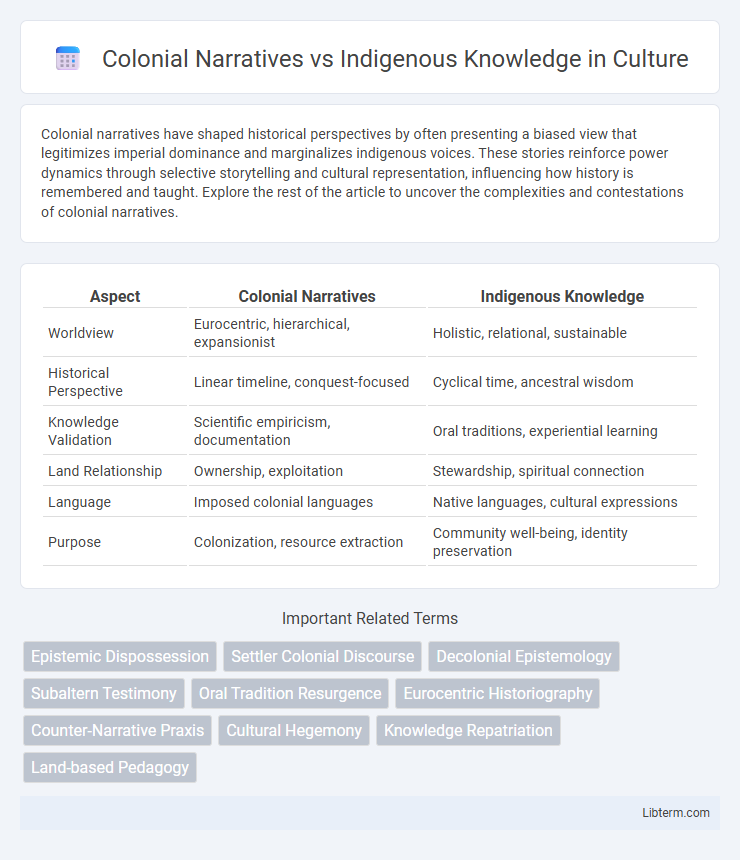Colonial narratives have shaped historical perspectives by often presenting a biased view that legitimizes imperial dominance and marginalizes indigenous voices. These stories reinforce power dynamics through selective storytelling and cultural representation, influencing how history is remembered and taught. Explore the rest of the article to uncover the complexities and contestations of colonial narratives.
Table of Comparison
| Aspect | Colonial Narratives | Indigenous Knowledge |
|---|---|---|
| Worldview | Eurocentric, hierarchical, expansionist | Holistic, relational, sustainable |
| Historical Perspective | Linear timeline, conquest-focused | Cyclical time, ancestral wisdom |
| Knowledge Validation | Scientific empiricism, documentation | Oral traditions, experiential learning |
| Land Relationship | Ownership, exploitation | Stewardship, spiritual connection |
| Language | Imposed colonial languages | Native languages, cultural expressions |
| Purpose | Colonization, resource extraction | Community well-being, identity preservation |
Understanding Colonial Narratives
Colonial narratives often depict indigenous cultures through a lens of superiority and domination, marginalizing traditional knowledge systems and histories. These narratives prioritize Eurocentric viewpoints, framing indigenous peoples as subjects to be civilized or obstacles to progress. Understanding colonial narratives requires examining the power dynamics and historical context that shaped these portrayals, revealing their impact on cultural representation and identity.
Defining Indigenous Knowledge Systems
Indigenous Knowledge Systems encompass the traditional understandings, practices, and cultural expressions developed and sustained by Indigenous communities over generations, emphasizing a holistic connection to land, nature, and spirituality. These systems prioritize oral histories, ecological wisdom, and community-based learning methods that contrast sharply with colonial narratives grounded in Western epistemology and written records. Recognizing Indigenous Knowledge as valid and dynamic challenges colonial frameworks by affirming diverse ways of knowing and fostering respect for Indigenous sovereignty and cultural heritage.
Historical Roots of Colonial Perspectives
Colonial narratives originated from Eurocentric worldviews that justified territorial conquest and cultural domination through constructed hierarchies of knowledge, often marginalizing Indigenous epistemologies as primitive or irrelevant. These perspectives were embedded in historical documents, missionary accounts, and colonial administration records that framed Indigenous peoples through biased lenses, reinforcing control and exploitation. The lasting impact of these colonial narratives continues to shape power dynamics and cultural representations, overshadowing the validity of Indigenous knowledge systems rooted in ancestral traditions and holistic understanding of the environment.
Epistemological Differences: West vs Indigenous
Colonial narratives often prioritize linear, universal knowledge systems rooted in Western scientific methodologies, emphasizing objectivity and categorization. Indigenous knowledge systems are holistic, context-specific, and interwoven with spiritual and community practices, valuing oral traditions and relational understanding. These epistemological differences highlight contrasting worldviews where Western approaches seek control and dominance, while Indigenous perspectives nurture coexistence and reciprocity with the environment.
Power Dynamics in Knowledge Production
Colonial narratives historically dominate knowledge production by imposing Eurocentric worldviews and marginalizing Indigenous epistemologies, reinforcing systems of power and control. Indigenous knowledge, rooted in community, land, and oral traditions, challenges these hegemonies by emphasizing relationality and sustainability. Examining power dynamics reveals how knowledge systems are not neutral but intertwined with political authority and cultural sovereignty.
The Role of Language in Shaping Narratives
Language serves as a powerful tool in colonial narratives, often imposing dominant perspectives while marginalizing indigenous voices and epistemologies. Indigenous knowledge systems utilize native languages to preserve cultural heritage, oral traditions, and worldview, reinforcing identity and resistance against colonial erasure. The differing linguistic frameworks create distinct meaning-making processes that shape historical interpretations and collective memory.
Impacts on Education and Curriculum
Colonial narratives have historically marginalized Indigenous knowledge, leading to education systems that prioritize Western perspectives and undermine Indigenous worldviews. This exclusion results in curricula that often omit Indigenous histories, languages, and cultural practices, contributing to a lack of representation and cultural erasure in educational settings. Integrating Indigenous knowledge into curricula fosters culturally relevant pedagogy, promotes inclusivity, and supports the preservation and revitalization of Indigenous identities within formal education.
Decolonizing Knowledge: Methods and Movements
Decolonizing knowledge involves challenging colonial narratives that have historically marginalized Indigenous knowledge systems by prioritizing oral traditions, community-based epistemologies, and land-centered understandings. Methods include collaborative research practices, Indigenous-led curricula development, and the integration of Indigenous languages in academic discourse to restore epistemic sovereignty. Movements such as the Indigenous Research Methodologies and the Global Indigenous Knowledge Movement emphasize dismantling epistemic injustice and fostering respect for diverse worldview frameworks.
Revitalization of Indigenous Worldviews
Revitalization of Indigenous worldviews challenges colonial narratives by reclaiming ancestral knowledge systems and cultural practices marginalized during colonization. Efforts center on integrating Indigenous languages, ceremonies, and ecological wisdom to restore community identity and resilience. This resurgence fosters decolonization and supports sovereignty over land, education, and governance within Indigenous nations.
Paths Toward Reconciliation and Knowledge Integration
Paths toward reconciliation emphasize valuing Indigenous knowledge systems alongside colonial narratives to foster mutual understanding and respect. Integrating Indigenous epistemologies into education, policy-making, and cultural discourse challenges dominant historical accounts and promotes holistic, decolonized perspectives. Collaborative frameworks prioritize Indigenous voices, ensuring knowledge exchange supports healing and equitable partnerships for sustainable futures.
Colonial Narratives Infographic

 libterm.com
libterm.com